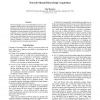3321 search results - page 99 / 665 » The Future of Knowledge Representation |
FLAIRS
2004
13 years 10 months ago
2004
Initial successes in the area of recommender systems have led to considerable early optimism. However as a research community, we are still in the early days of our understanding ...
URBAN
2008
13 years 8 months ago
2008
Intuitive and meaningful interpretation of geographical phenomena requires their representation at multiple levels of detail. This is due to the scale dependent nature of their pr...
ICML
2007
IEEE
14 years 9 months ago
2007
IEEE
The k-Nearest Neighbors algorithm can be easily adapted to classify complex objects (e.g. sets, graphs) as long as a proper dissimilarity function is given over an input space. Bo...
AAAI
1992
13 years 10 months ago
1992
The family of terminological representation systems has its roots in the representation system kl-one. Since the development of kl-one more than a dozen similar representation sys...
IJMMS
1998
13 years 8 months ago
1998
Situated cognition is not a mere philosophical concern: it has pragmatic implications for current practice in knowledge acquisition. Tools must move from being design-focused to b...

